Holmes Institute, T3 2019: Advanced Financial Accounting Report
VerifiedAdded on 2023/01/18
|8
|2839
|73
Report
AI Summary
This report delves into advanced financial accounting principles, specifically examining the concept of a reporting entity and the qualitative characteristics of financial information. It defines a reporting entity as one where users rely on general-purpose financial reports (GPFR) for decision-making, illustrated with the example of Crown Resorts Limited. The report then explores the fundamental qualitative characteristics: relevance and representational faithfulness. Relevance is defined by its predictive and confirmatory value, while representational faithfulness emphasizes completeness, neutrality, and freedom from error. The analysis of Crown Resorts Limited's financial reports demonstrates these characteristics, highlighting how the company provides relevant and faithfully represented financial information. The report concludes that for financial statements to be useful to stakeholders, they must embody relevance and faithful representation, making the financial information significant for its users. The analysis considers that the financial statements of Crown Resorts Limited are prepared according to the Australian Accounting Standards, and the report includes analysis of how the company follows the accounting principles in its financial reporting.
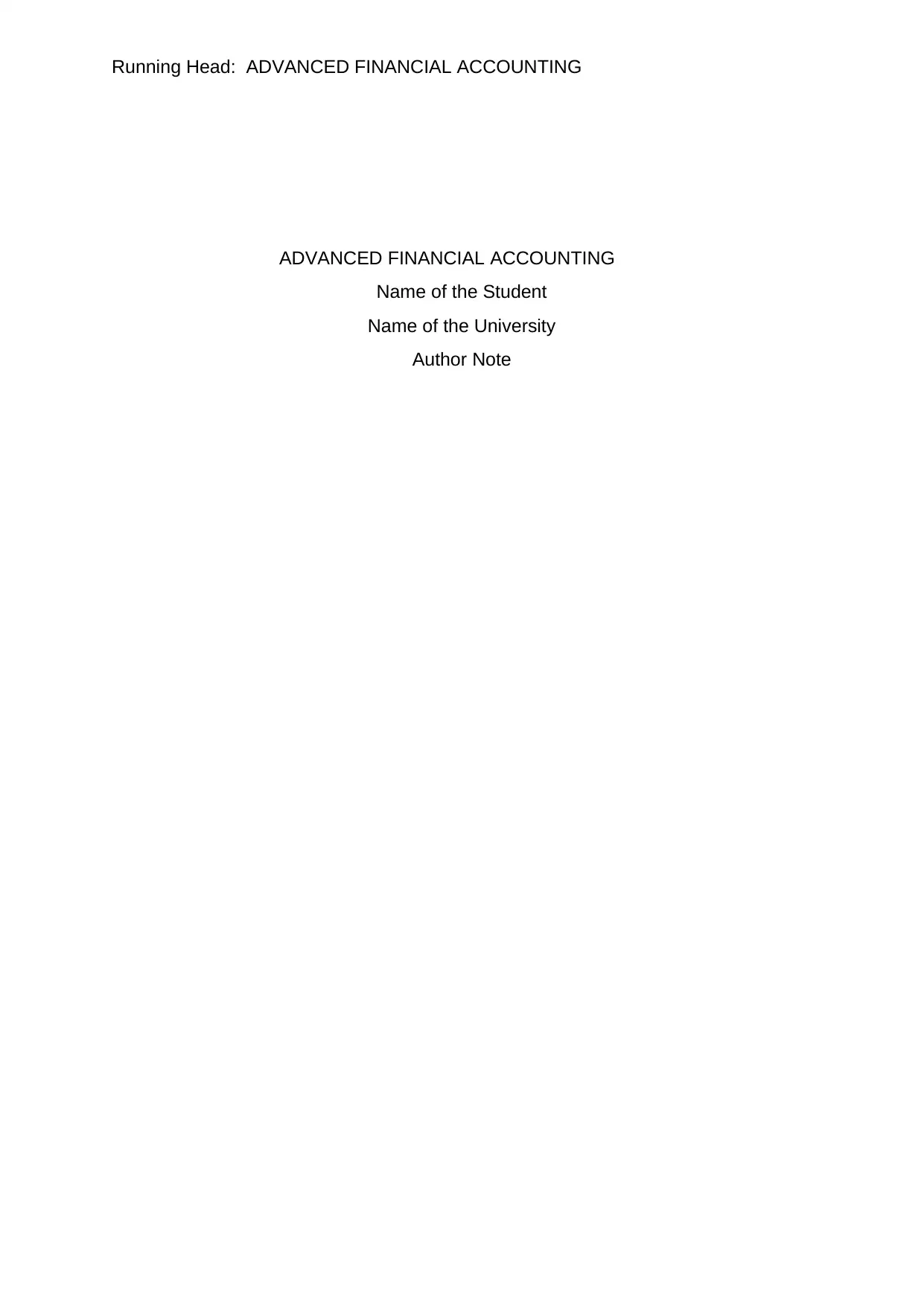
Running Head: ADVANCED FINANCIAL ACCOUNTING
ADVANCED FINANCIAL ACCOUNTING
Name of the Student
Name of the University
Author Note
ADVANCED FINANCIAL ACCOUNTING
Name of the Student
Name of the University
Author Note
Paraphrase This Document
Need a fresh take? Get an instant paraphrase of this document with our AI Paraphraser
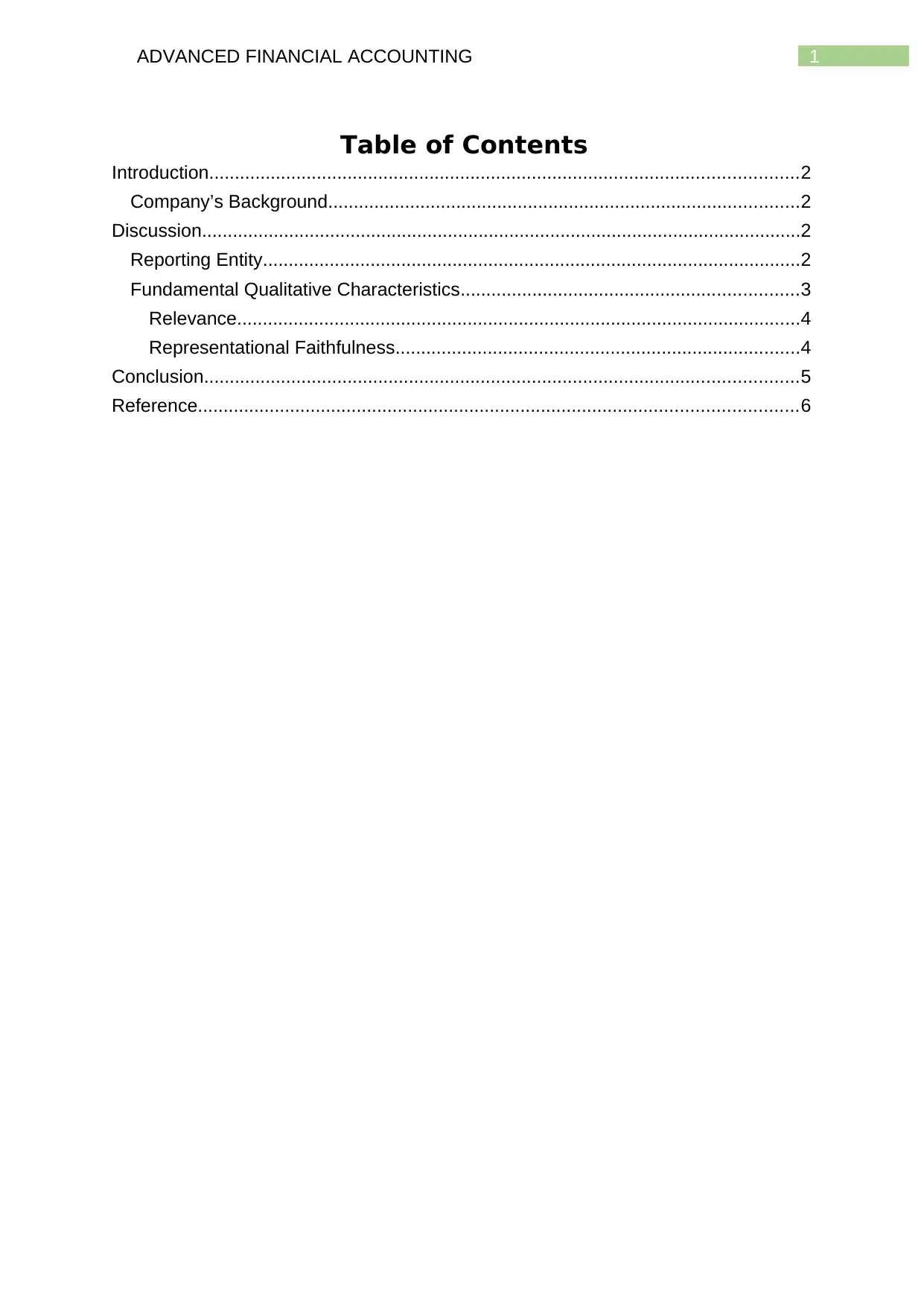
1ADVANCED FINANCIAL ACCOUNTING
Table of Contents
Introduction...................................................................................................................2
Company’s Background............................................................................................2
Discussion.....................................................................................................................2
Reporting Entity.........................................................................................................2
Fundamental Qualitative Characteristics..................................................................3
Relevance..............................................................................................................4
Representational Faithfulness...............................................................................4
Conclusion....................................................................................................................5
Reference.....................................................................................................................6
Table of Contents
Introduction...................................................................................................................2
Company’s Background............................................................................................2
Discussion.....................................................................................................................2
Reporting Entity.........................................................................................................2
Fundamental Qualitative Characteristics..................................................................3
Relevance..............................................................................................................4
Representational Faithfulness...............................................................................4
Conclusion....................................................................................................................5
Reference.....................................................................................................................6
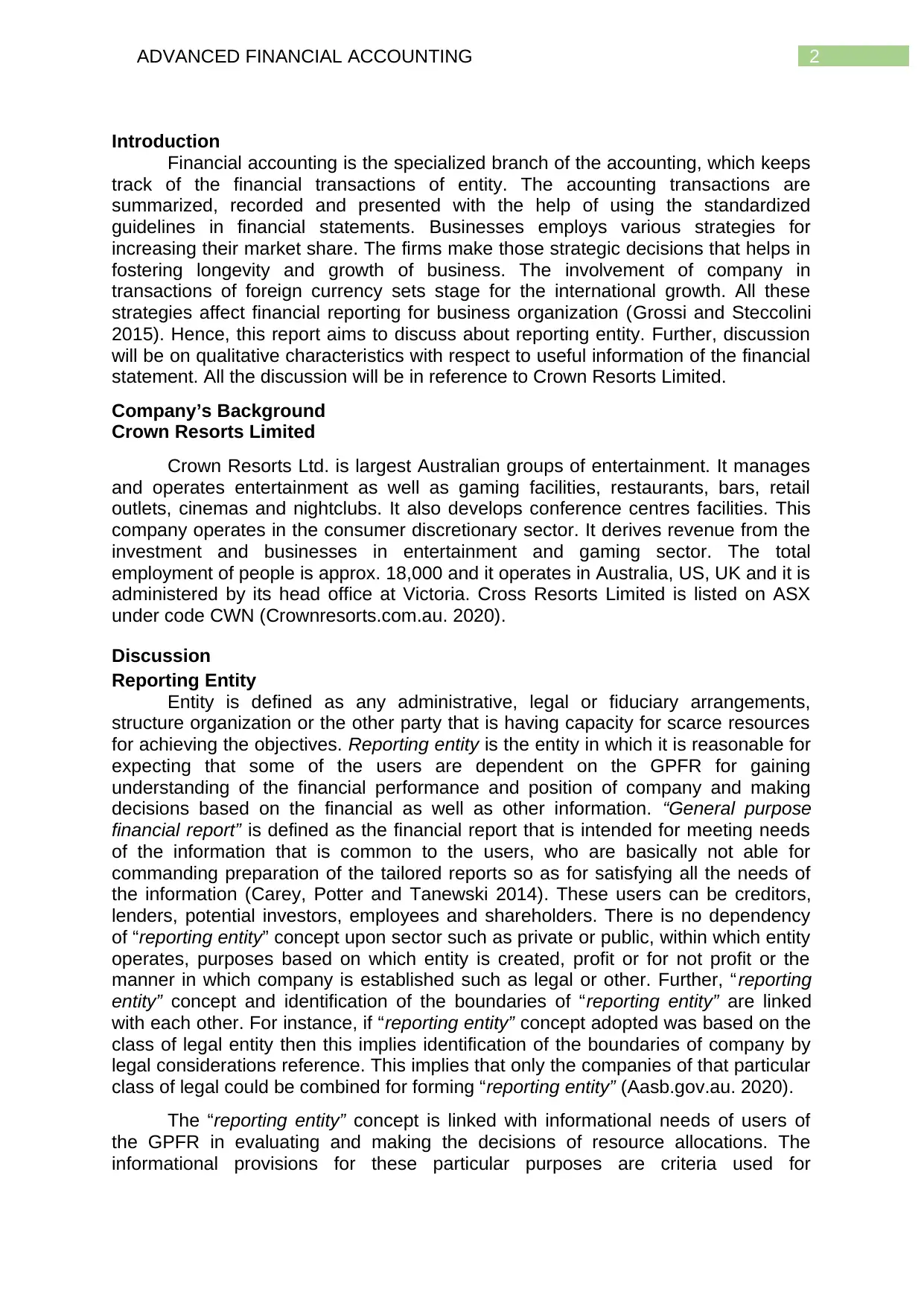
2ADVANCED FINANCIAL ACCOUNTING
Introduction
Financial accounting is the specialized branch of the accounting, which keeps
track of the financial transactions of entity. The accounting transactions are
summarized, recorded and presented with the help of using the standardized
guidelines in financial statements. Businesses employs various strategies for
increasing their market share. The firms make those strategic decisions that helps in
fostering longevity and growth of business. The involvement of company in
transactions of foreign currency sets stage for the international growth. All these
strategies affect financial reporting for business organization (Grossi and Steccolini
2015). Hence, this report aims to discuss about reporting entity. Further, discussion
will be on qualitative characteristics with respect to useful information of the financial
statement. All the discussion will be in reference to Crown Resorts Limited.
Company’s Background
Crown Resorts Limited
Crown Resorts Ltd. is largest Australian groups of entertainment. It manages
and operates entertainment as well as gaming facilities, restaurants, bars, retail
outlets, cinemas and nightclubs. It also develops conference centres facilities. This
company operates in the consumer discretionary sector. It derives revenue from the
investment and businesses in entertainment and gaming sector. The total
employment of people is approx. 18,000 and it operates in Australia, US, UK and it is
administered by its head office at Victoria. Cross Resorts Limited is listed on ASX
under code CWN (Crownresorts.com.au. 2020).
Discussion
Reporting Entity
Entity is defined as any administrative, legal or fiduciary arrangements,
structure organization or the other party that is having capacity for scarce resources
for achieving the objectives. Reporting entity is the entity in which it is reasonable for
expecting that some of the users are dependent on the GPFR for gaining
understanding of the financial performance and position of company and making
decisions based on the financial as well as other information. “General purpose
financial report” is defined as the financial report that is intended for meeting needs
of the information that is common to the users, who are basically not able for
commanding preparation of the tailored reports so as for satisfying all the needs of
the information (Carey, Potter and Tanewski 2014). These users can be creditors,
lenders, potential investors, employees and shareholders. There is no dependency
of “reporting entity” concept upon sector such as private or public, within which entity
operates, purposes based on which entity is created, profit or for not profit or the
manner in which company is established such as legal or other. Further, “reporting
entity” concept and identification of the boundaries of “reporting entity” are linked
with each other. For instance, if “reporting entity” concept adopted was based on the
class of legal entity then this implies identification of the boundaries of company by
legal considerations reference. This implies that only the companies of that particular
class of legal could be combined for forming “reporting entity” (Aasb.gov.au. 2020).
The “reporting entity” concept is linked with informational needs of users of
the GPFR in evaluating and making the decisions of resource allocations. The
informational provisions for these particular purposes are criteria used for
Introduction
Financial accounting is the specialized branch of the accounting, which keeps
track of the financial transactions of entity. The accounting transactions are
summarized, recorded and presented with the help of using the standardized
guidelines in financial statements. Businesses employs various strategies for
increasing their market share. The firms make those strategic decisions that helps in
fostering longevity and growth of business. The involvement of company in
transactions of foreign currency sets stage for the international growth. All these
strategies affect financial reporting for business organization (Grossi and Steccolini
2015). Hence, this report aims to discuss about reporting entity. Further, discussion
will be on qualitative characteristics with respect to useful information of the financial
statement. All the discussion will be in reference to Crown Resorts Limited.
Company’s Background
Crown Resorts Limited
Crown Resorts Ltd. is largest Australian groups of entertainment. It manages
and operates entertainment as well as gaming facilities, restaurants, bars, retail
outlets, cinemas and nightclubs. It also develops conference centres facilities. This
company operates in the consumer discretionary sector. It derives revenue from the
investment and businesses in entertainment and gaming sector. The total
employment of people is approx. 18,000 and it operates in Australia, US, UK and it is
administered by its head office at Victoria. Cross Resorts Limited is listed on ASX
under code CWN (Crownresorts.com.au. 2020).
Discussion
Reporting Entity
Entity is defined as any administrative, legal or fiduciary arrangements,
structure organization or the other party that is having capacity for scarce resources
for achieving the objectives. Reporting entity is the entity in which it is reasonable for
expecting that some of the users are dependent on the GPFR for gaining
understanding of the financial performance and position of company and making
decisions based on the financial as well as other information. “General purpose
financial report” is defined as the financial report that is intended for meeting needs
of the information that is common to the users, who are basically not able for
commanding preparation of the tailored reports so as for satisfying all the needs of
the information (Carey, Potter and Tanewski 2014). These users can be creditors,
lenders, potential investors, employees and shareholders. There is no dependency
of “reporting entity” concept upon sector such as private or public, within which entity
operates, purposes based on which entity is created, profit or for not profit or the
manner in which company is established such as legal or other. Further, “reporting
entity” concept and identification of the boundaries of “reporting entity” are linked
with each other. For instance, if “reporting entity” concept adopted was based on the
class of legal entity then this implies identification of the boundaries of company by
legal considerations reference. This implies that only the companies of that particular
class of legal could be combined for forming “reporting entity” (Aasb.gov.au. 2020).
The “reporting entity” concept is linked with informational needs of users of
the GPFR in evaluating and making the decisions of resource allocations. The
informational provisions for these particular purposes are criteria used for
⊘ This is a preview!⊘
Do you want full access?
Subscribe today to unlock all pages.

Trusted by 1+ million students worldwide
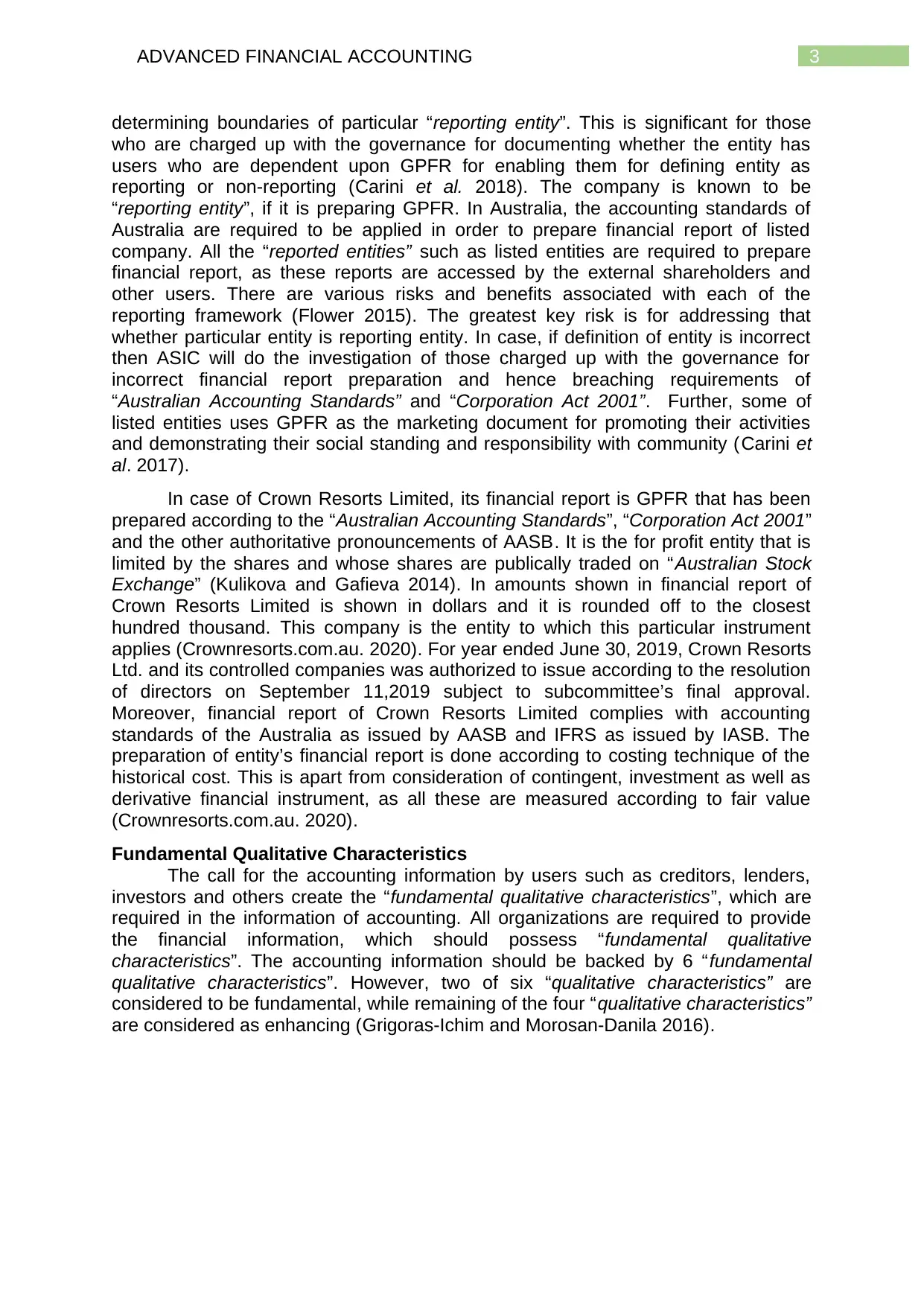
3ADVANCED FINANCIAL ACCOUNTING
determining boundaries of particular “reporting entity”. This is significant for those
who are charged up with the governance for documenting whether the entity has
users who are dependent upon GPFR for enabling them for defining entity as
reporting or non-reporting (Carini et al. 2018). The company is known to be
“reporting entity”, if it is preparing GPFR. In Australia, the accounting standards of
Australia are required to be applied in order to prepare financial report of listed
company. All the “reported entities” such as listed entities are required to prepare
financial report, as these reports are accessed by the external shareholders and
other users. There are various risks and benefits associated with each of the
reporting framework (Flower 2015). The greatest key risk is for addressing that
whether particular entity is reporting entity. In case, if definition of entity is incorrect
then ASIC will do the investigation of those charged up with the governance for
incorrect financial report preparation and hence breaching requirements of
“Australian Accounting Standards” and “Corporation Act 2001”. Further, some of
listed entities uses GPFR as the marketing document for promoting their activities
and demonstrating their social standing and responsibility with community (Carini et
al. 2017).
In case of Crown Resorts Limited, its financial report is GPFR that has been
prepared according to the “Australian Accounting Standards”, “Corporation Act 2001”
and the other authoritative pronouncements of AASB. It is the for profit entity that is
limited by the shares and whose shares are publically traded on “Australian Stock
Exchange” (Kulikova and Gafieva 2014). In amounts shown in financial report of
Crown Resorts Limited is shown in dollars and it is rounded off to the closest
hundred thousand. This company is the entity to which this particular instrument
applies (Crownresorts.com.au. 2020). For year ended June 30, 2019, Crown Resorts
Ltd. and its controlled companies was authorized to issue according to the resolution
of directors on September 11,2019 subject to subcommittee’s final approval.
Moreover, financial report of Crown Resorts Limited complies with accounting
standards of the Australia as issued by AASB and IFRS as issued by IASB. The
preparation of entity’s financial report is done according to costing technique of the
historical cost. This is apart from consideration of contingent, investment as well as
derivative financial instrument, as all these are measured according to fair value
(Crownresorts.com.au. 2020).
Fundamental Qualitative Characteristics
The call for the accounting information by users such as creditors, lenders,
investors and others create the “fundamental qualitative characteristics”, which are
required in the information of accounting. All organizations are required to provide
the financial information, which should possess “fundamental qualitative
characteristics”. The accounting information should be backed by 6 “fundamental
qualitative characteristics”. However, two of six “qualitative characteristics” are
considered to be fundamental, while remaining of the four “qualitative characteristics”
are considered as enhancing (Grigoras-Ichim and Morosan-Danila 2016).
determining boundaries of particular “reporting entity”. This is significant for those
who are charged up with the governance for documenting whether the entity has
users who are dependent upon GPFR for enabling them for defining entity as
reporting or non-reporting (Carini et al. 2018). The company is known to be
“reporting entity”, if it is preparing GPFR. In Australia, the accounting standards of
Australia are required to be applied in order to prepare financial report of listed
company. All the “reported entities” such as listed entities are required to prepare
financial report, as these reports are accessed by the external shareholders and
other users. There are various risks and benefits associated with each of the
reporting framework (Flower 2015). The greatest key risk is for addressing that
whether particular entity is reporting entity. In case, if definition of entity is incorrect
then ASIC will do the investigation of those charged up with the governance for
incorrect financial report preparation and hence breaching requirements of
“Australian Accounting Standards” and “Corporation Act 2001”. Further, some of
listed entities uses GPFR as the marketing document for promoting their activities
and demonstrating their social standing and responsibility with community (Carini et
al. 2017).
In case of Crown Resorts Limited, its financial report is GPFR that has been
prepared according to the “Australian Accounting Standards”, “Corporation Act 2001”
and the other authoritative pronouncements of AASB. It is the for profit entity that is
limited by the shares and whose shares are publically traded on “Australian Stock
Exchange” (Kulikova and Gafieva 2014). In amounts shown in financial report of
Crown Resorts Limited is shown in dollars and it is rounded off to the closest
hundred thousand. This company is the entity to which this particular instrument
applies (Crownresorts.com.au. 2020). For year ended June 30, 2019, Crown Resorts
Ltd. and its controlled companies was authorized to issue according to the resolution
of directors on September 11,2019 subject to subcommittee’s final approval.
Moreover, financial report of Crown Resorts Limited complies with accounting
standards of the Australia as issued by AASB and IFRS as issued by IASB. The
preparation of entity’s financial report is done according to costing technique of the
historical cost. This is apart from consideration of contingent, investment as well as
derivative financial instrument, as all these are measured according to fair value
(Crownresorts.com.au. 2020).
Fundamental Qualitative Characteristics
The call for the accounting information by users such as creditors, lenders,
investors and others create the “fundamental qualitative characteristics”, which are
required in the information of accounting. All organizations are required to provide
the financial information, which should possess “fundamental qualitative
characteristics”. The accounting information should be backed by 6 “fundamental
qualitative characteristics”. However, two of six “qualitative characteristics” are
considered to be fundamental, while remaining of the four “qualitative characteristics”
are considered as enhancing (Grigoras-Ichim and Morosan-Danila 2016).
Paraphrase This Document
Need a fresh take? Get an instant paraphrase of this document with our AI Paraphraser
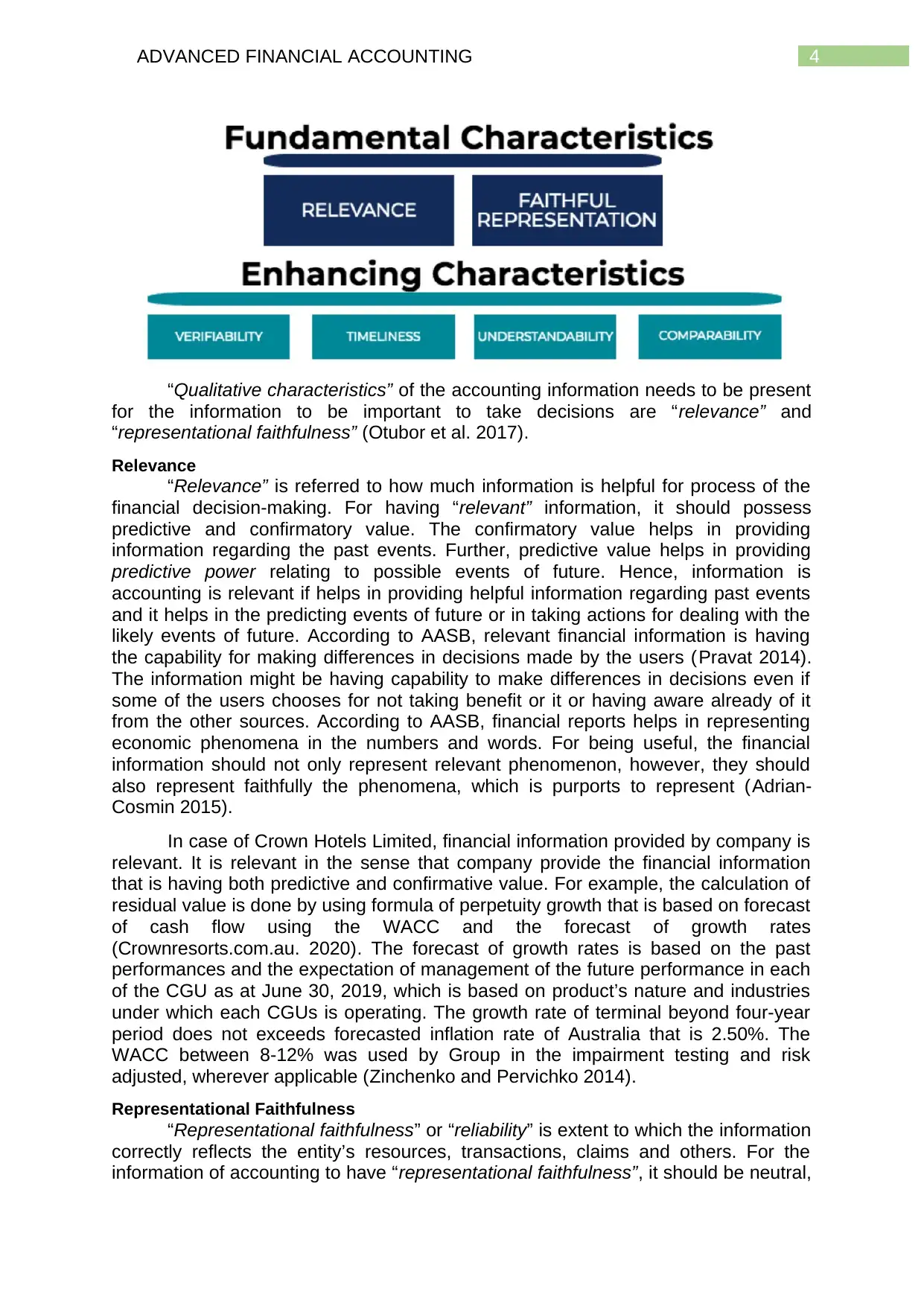
4ADVANCED FINANCIAL ACCOUNTING
“Qualitative characteristics” of the accounting information needs to be present
for the information to be important to take decisions are “relevance” and
“representational faithfulness” (Otubor et al. 2017).
Relevance
“Relevance” is referred to how much information is helpful for process of the
financial decision-making. For having “relevant” information, it should possess
predictive and confirmatory value. The confirmatory value helps in providing
information regarding the past events. Further, predictive value helps in providing
predictive power relating to possible events of future. Hence, information is
accounting is relevant if helps in providing helpful information regarding past events
and it helps in the predicting events of future or in taking actions for dealing with the
likely events of future. According to AASB, relevant financial information is having
the capability for making differences in decisions made by the users (Pravat 2014).
The information might be having capability to make differences in decisions even if
some of the users chooses for not taking benefit or it or having aware already of it
from the other sources. According to AASB, financial reports helps in representing
economic phenomena in the numbers and words. For being useful, the financial
information should not only represent relevant phenomenon, however, they should
also represent faithfully the phenomena, which is purports to represent (Adrian-
Cosmin 2015).
In case of Crown Hotels Limited, financial information provided by company is
relevant. It is relevant in the sense that company provide the financial information
that is having both predictive and confirmative value. For example, the calculation of
residual value is done by using formula of perpetuity growth that is based on forecast
of cash flow using the WACC and the forecast of growth rates
(Crownresorts.com.au. 2020). The forecast of growth rates is based on the past
performances and the expectation of management of the future performance in each
of the CGU as at June 30, 2019, which is based on product’s nature and industries
under which each CGUs is operating. The growth rate of terminal beyond four-year
period does not exceeds forecasted inflation rate of Australia that is 2.50%. The
WACC between 8-12% was used by Group in the impairment testing and risk
adjusted, wherever applicable (Zinchenko and Pervichko 2014).
Representational Faithfulness
“Representational faithfulness” or “reliability” is extent to which the information
correctly reflects the entity’s resources, transactions, claims and others. For the
information of accounting to have “representational faithfulness”, it should be neutral,
“Qualitative characteristics” of the accounting information needs to be present
for the information to be important to take decisions are “relevance” and
“representational faithfulness” (Otubor et al. 2017).
Relevance
“Relevance” is referred to how much information is helpful for process of the
financial decision-making. For having “relevant” information, it should possess
predictive and confirmatory value. The confirmatory value helps in providing
information regarding the past events. Further, predictive value helps in providing
predictive power relating to possible events of future. Hence, information is
accounting is relevant if helps in providing helpful information regarding past events
and it helps in the predicting events of future or in taking actions for dealing with the
likely events of future. According to AASB, relevant financial information is having
the capability for making differences in decisions made by the users (Pravat 2014).
The information might be having capability to make differences in decisions even if
some of the users chooses for not taking benefit or it or having aware already of it
from the other sources. According to AASB, financial reports helps in representing
economic phenomena in the numbers and words. For being useful, the financial
information should not only represent relevant phenomenon, however, they should
also represent faithfully the phenomena, which is purports to represent (Adrian-
Cosmin 2015).
In case of Crown Hotels Limited, financial information provided by company is
relevant. It is relevant in the sense that company provide the financial information
that is having both predictive and confirmative value. For example, the calculation of
residual value is done by using formula of perpetuity growth that is based on forecast
of cash flow using the WACC and the forecast of growth rates
(Crownresorts.com.au. 2020). The forecast of growth rates is based on the past
performances and the expectation of management of the future performance in each
of the CGU as at June 30, 2019, which is based on product’s nature and industries
under which each CGUs is operating. The growth rate of terminal beyond four-year
period does not exceeds forecasted inflation rate of Australia that is 2.50%. The
WACC between 8-12% was used by Group in the impairment testing and risk
adjusted, wherever applicable (Zinchenko and Pervichko 2014).
Representational Faithfulness
“Representational faithfulness” or “reliability” is extent to which the information
correctly reflects the entity’s resources, transactions, claims and others. For the
information of accounting to have “representational faithfulness”, it should be neutral,
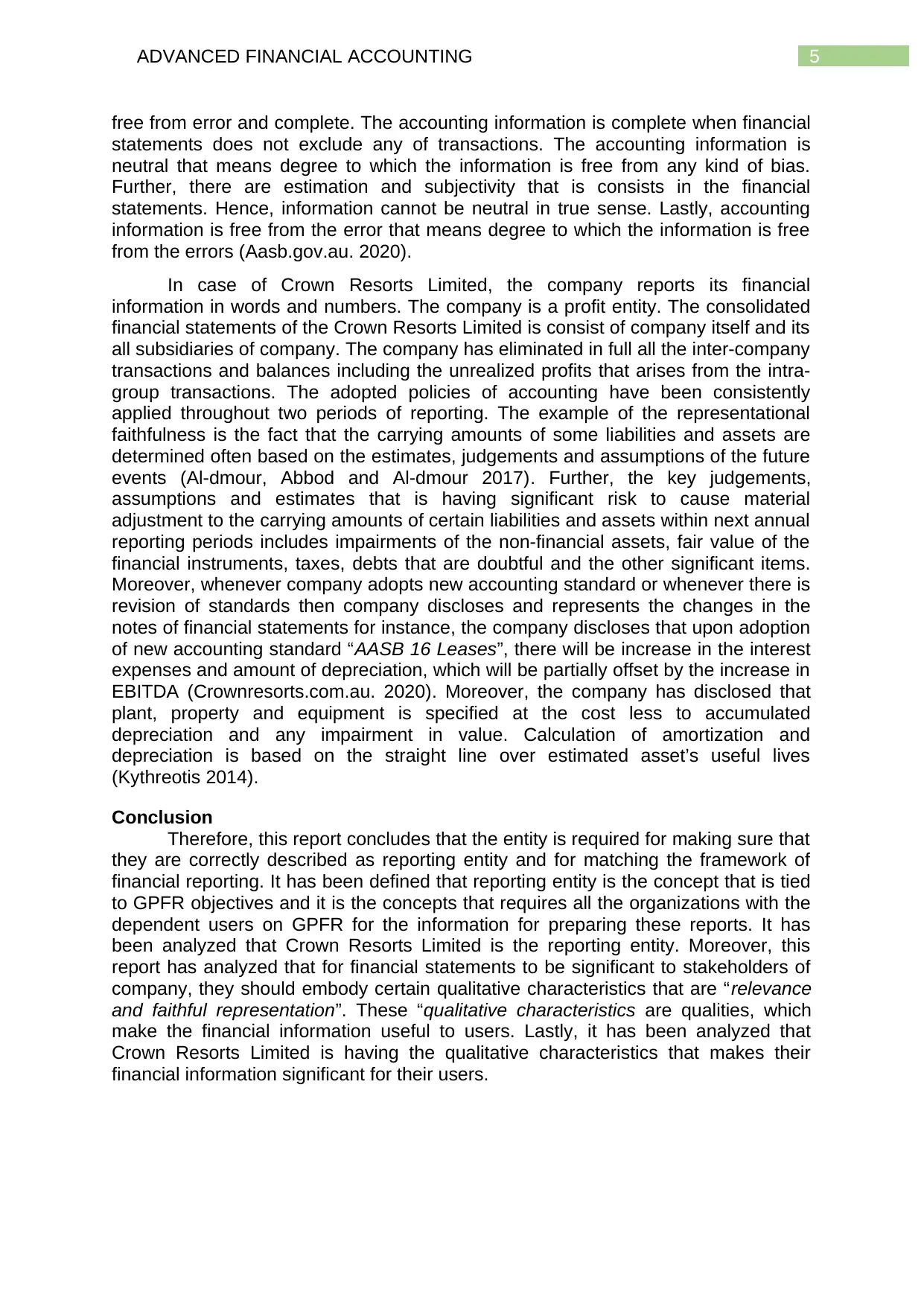
5ADVANCED FINANCIAL ACCOUNTING
free from error and complete. The accounting information is complete when financial
statements does not exclude any of transactions. The accounting information is
neutral that means degree to which the information is free from any kind of bias.
Further, there are estimation and subjectivity that is consists in the financial
statements. Hence, information cannot be neutral in true sense. Lastly, accounting
information is free from the error that means degree to which the information is free
from the errors (Aasb.gov.au. 2020).
In case of Crown Resorts Limited, the company reports its financial
information in words and numbers. The company is a profit entity. The consolidated
financial statements of the Crown Resorts Limited is consist of company itself and its
all subsidiaries of company. The company has eliminated in full all the inter-company
transactions and balances including the unrealized profits that arises from the intra-
group transactions. The adopted policies of accounting have been consistently
applied throughout two periods of reporting. The example of the representational
faithfulness is the fact that the carrying amounts of some liabilities and assets are
determined often based on the estimates, judgements and assumptions of the future
events (Al-dmour, Abbod and Al-dmour 2017). Further, the key judgements,
assumptions and estimates that is having significant risk to cause material
adjustment to the carrying amounts of certain liabilities and assets within next annual
reporting periods includes impairments of the non-financial assets, fair value of the
financial instruments, taxes, debts that are doubtful and the other significant items.
Moreover, whenever company adopts new accounting standard or whenever there is
revision of standards then company discloses and represents the changes in the
notes of financial statements for instance, the company discloses that upon adoption
of new accounting standard “AASB 16 Leases”, there will be increase in the interest
expenses and amount of depreciation, which will be partially offset by the increase in
EBITDA (Crownresorts.com.au. 2020). Moreover, the company has disclosed that
plant, property and equipment is specified at the cost less to accumulated
depreciation and any impairment in value. Calculation of amortization and
depreciation is based on the straight line over estimated asset’s useful lives
(Kythreotis 2014).
Conclusion
Therefore, this report concludes that the entity is required for making sure that
they are correctly described as reporting entity and for matching the framework of
financial reporting. It has been defined that reporting entity is the concept that is tied
to GPFR objectives and it is the concepts that requires all the organizations with the
dependent users on GPFR for the information for preparing these reports. It has
been analyzed that Crown Resorts Limited is the reporting entity. Moreover, this
report has analyzed that for financial statements to be significant to stakeholders of
company, they should embody certain qualitative characteristics that are “relevance
and faithful representation”. These “qualitative characteristics are qualities, which
make the financial information useful to users. Lastly, it has been analyzed that
Crown Resorts Limited is having the qualitative characteristics that makes their
financial information significant for their users.
free from error and complete. The accounting information is complete when financial
statements does not exclude any of transactions. The accounting information is
neutral that means degree to which the information is free from any kind of bias.
Further, there are estimation and subjectivity that is consists in the financial
statements. Hence, information cannot be neutral in true sense. Lastly, accounting
information is free from the error that means degree to which the information is free
from the errors (Aasb.gov.au. 2020).
In case of Crown Resorts Limited, the company reports its financial
information in words and numbers. The company is a profit entity. The consolidated
financial statements of the Crown Resorts Limited is consist of company itself and its
all subsidiaries of company. The company has eliminated in full all the inter-company
transactions and balances including the unrealized profits that arises from the intra-
group transactions. The adopted policies of accounting have been consistently
applied throughout two periods of reporting. The example of the representational
faithfulness is the fact that the carrying amounts of some liabilities and assets are
determined often based on the estimates, judgements and assumptions of the future
events (Al-dmour, Abbod and Al-dmour 2017). Further, the key judgements,
assumptions and estimates that is having significant risk to cause material
adjustment to the carrying amounts of certain liabilities and assets within next annual
reporting periods includes impairments of the non-financial assets, fair value of the
financial instruments, taxes, debts that are doubtful and the other significant items.
Moreover, whenever company adopts new accounting standard or whenever there is
revision of standards then company discloses and represents the changes in the
notes of financial statements for instance, the company discloses that upon adoption
of new accounting standard “AASB 16 Leases”, there will be increase in the interest
expenses and amount of depreciation, which will be partially offset by the increase in
EBITDA (Crownresorts.com.au. 2020). Moreover, the company has disclosed that
plant, property and equipment is specified at the cost less to accumulated
depreciation and any impairment in value. Calculation of amortization and
depreciation is based on the straight line over estimated asset’s useful lives
(Kythreotis 2014).
Conclusion
Therefore, this report concludes that the entity is required for making sure that
they are correctly described as reporting entity and for matching the framework of
financial reporting. It has been defined that reporting entity is the concept that is tied
to GPFR objectives and it is the concepts that requires all the organizations with the
dependent users on GPFR for the information for preparing these reports. It has
been analyzed that Crown Resorts Limited is the reporting entity. Moreover, this
report has analyzed that for financial statements to be significant to stakeholders of
company, they should embody certain qualitative characteristics that are “relevance
and faithful representation”. These “qualitative characteristics are qualities, which
make the financial information useful to users. Lastly, it has been analyzed that
Crown Resorts Limited is having the qualitative characteristics that makes their
financial information significant for their users.
⊘ This is a preview!⊘
Do you want full access?
Subscribe today to unlock all pages.

Trusted by 1+ million students worldwide
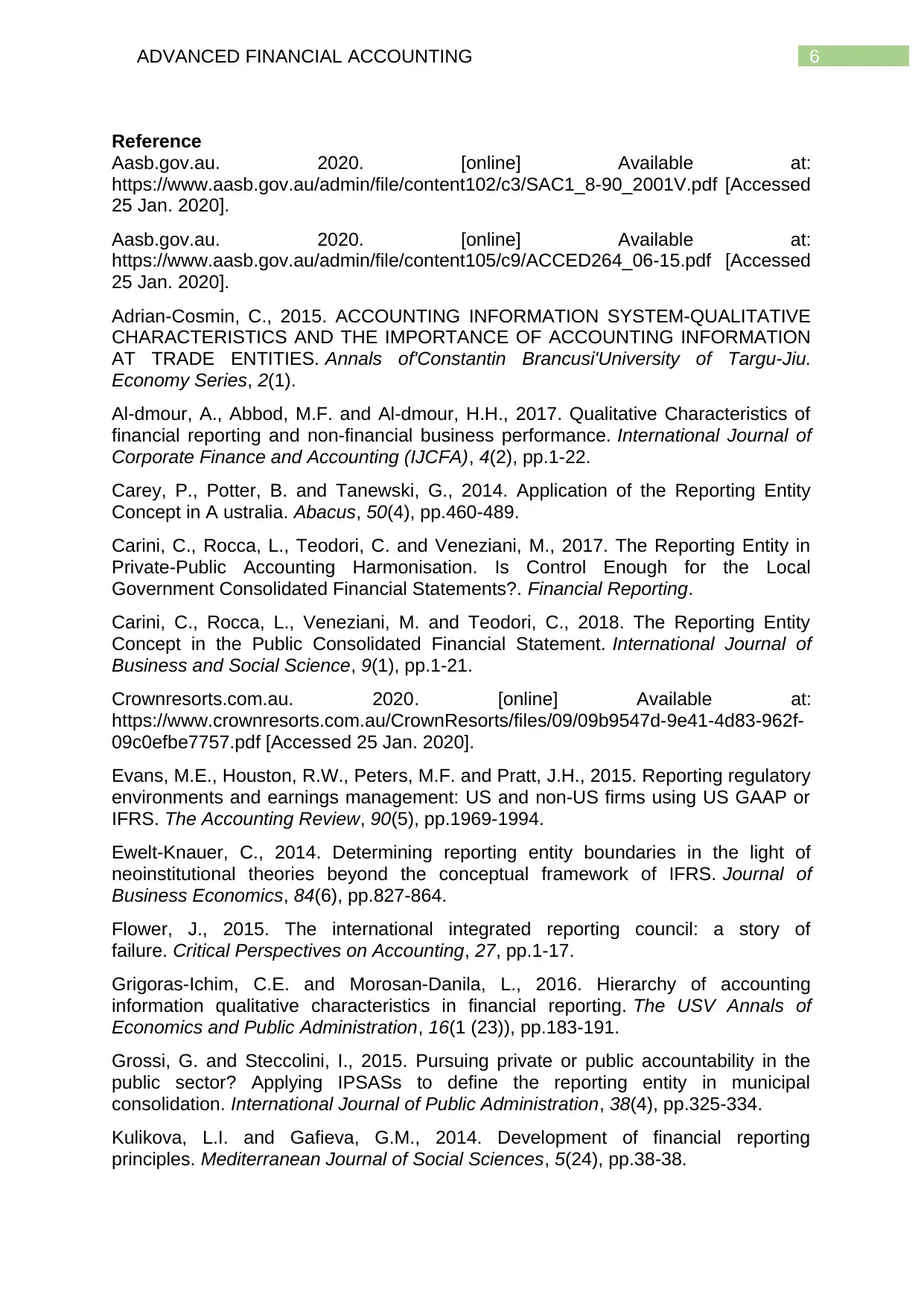
6ADVANCED FINANCIAL ACCOUNTING
Reference
Aasb.gov.au. 2020. [online] Available at:
https://www.aasb.gov.au/admin/file/content102/c3/SAC1_8-90_2001V.pdf [Accessed
25 Jan. 2020].
Aasb.gov.au. 2020. [online] Available at:
https://www.aasb.gov.au/admin/file/content105/c9/ACCED264_06-15.pdf [Accessed
25 Jan. 2020].
Adrian-Cosmin, C., 2015. ACCOUNTING INFORMATION SYSTEM-QUALITATIVE
CHARACTERISTICS AND THE IMPORTANCE OF ACCOUNTING INFORMATION
AT TRADE ENTITIES. Annals of'Constantin Brancusi'University of Targu-Jiu.
Economy Series, 2(1).
Al-dmour, A., Abbod, M.F. and Al-dmour, H.H., 2017. Qualitative Characteristics of
financial reporting and non-financial business performance. International Journal of
Corporate Finance and Accounting (IJCFA), 4(2), pp.1-22.
Carey, P., Potter, B. and Tanewski, G., 2014. Application of the Reporting Entity
Concept in A ustralia. Abacus, 50(4), pp.460-489.
Carini, C., Rocca, L., Teodori, C. and Veneziani, M., 2017. The Reporting Entity in
Private-Public Accounting Harmonisation. Is Control Enough for the Local
Government Consolidated Financial Statements?. Financial Reporting.
Carini, C., Rocca, L., Veneziani, M. and Teodori, C., 2018. The Reporting Entity
Concept in the Public Consolidated Financial Statement. International Journal of
Business and Social Science, 9(1), pp.1-21.
Crownresorts.com.au. 2020. [online] Available at:
https://www.crownresorts.com.au/CrownResorts/files/09/09b9547d-9e41-4d83-962f-
09c0efbe7757.pdf [Accessed 25 Jan. 2020].
Evans, M.E., Houston, R.W., Peters, M.F. and Pratt, J.H., 2015. Reporting regulatory
environments and earnings management: US and non-US firms using US GAAP or
IFRS. The Accounting Review, 90(5), pp.1969-1994.
Ewelt-Knauer, C., 2014. Determining reporting entity boundaries in the light of
neoinstitutional theories beyond the conceptual framework of IFRS. Journal of
Business Economics, 84(6), pp.827-864.
Flower, J., 2015. The international integrated reporting council: a story of
failure. Critical Perspectives on Accounting, 27, pp.1-17.
Grigoras-Ichim, C.E. and Morosan-Danila, L., 2016. Hierarchy of accounting
information qualitative characteristics in financial reporting. The USV Annals of
Economics and Public Administration, 16(1 (23)), pp.183-191.
Grossi, G. and Steccolini, I., 2015. Pursuing private or public accountability in the
public sector? Applying IPSASs to define the reporting entity in municipal
consolidation. International Journal of Public Administration, 38(4), pp.325-334.
Kulikova, L.I. and Gafieva, G.M., 2014. Development of financial reporting
principles. Mediterranean Journal of Social Sciences, 5(24), pp.38-38.
Reference
Aasb.gov.au. 2020. [online] Available at:
https://www.aasb.gov.au/admin/file/content102/c3/SAC1_8-90_2001V.pdf [Accessed
25 Jan. 2020].
Aasb.gov.au. 2020. [online] Available at:
https://www.aasb.gov.au/admin/file/content105/c9/ACCED264_06-15.pdf [Accessed
25 Jan. 2020].
Adrian-Cosmin, C., 2015. ACCOUNTING INFORMATION SYSTEM-QUALITATIVE
CHARACTERISTICS AND THE IMPORTANCE OF ACCOUNTING INFORMATION
AT TRADE ENTITIES. Annals of'Constantin Brancusi'University of Targu-Jiu.
Economy Series, 2(1).
Al-dmour, A., Abbod, M.F. and Al-dmour, H.H., 2017. Qualitative Characteristics of
financial reporting and non-financial business performance. International Journal of
Corporate Finance and Accounting (IJCFA), 4(2), pp.1-22.
Carey, P., Potter, B. and Tanewski, G., 2014. Application of the Reporting Entity
Concept in A ustralia. Abacus, 50(4), pp.460-489.
Carini, C., Rocca, L., Teodori, C. and Veneziani, M., 2017. The Reporting Entity in
Private-Public Accounting Harmonisation. Is Control Enough for the Local
Government Consolidated Financial Statements?. Financial Reporting.
Carini, C., Rocca, L., Veneziani, M. and Teodori, C., 2018. The Reporting Entity
Concept in the Public Consolidated Financial Statement. International Journal of
Business and Social Science, 9(1), pp.1-21.
Crownresorts.com.au. 2020. [online] Available at:
https://www.crownresorts.com.au/CrownResorts/files/09/09b9547d-9e41-4d83-962f-
09c0efbe7757.pdf [Accessed 25 Jan. 2020].
Evans, M.E., Houston, R.W., Peters, M.F. and Pratt, J.H., 2015. Reporting regulatory
environments and earnings management: US and non-US firms using US GAAP or
IFRS. The Accounting Review, 90(5), pp.1969-1994.
Ewelt-Knauer, C., 2014. Determining reporting entity boundaries in the light of
neoinstitutional theories beyond the conceptual framework of IFRS. Journal of
Business Economics, 84(6), pp.827-864.
Flower, J., 2015. The international integrated reporting council: a story of
failure. Critical Perspectives on Accounting, 27, pp.1-17.
Grigoras-Ichim, C.E. and Morosan-Danila, L., 2016. Hierarchy of accounting
information qualitative characteristics in financial reporting. The USV Annals of
Economics and Public Administration, 16(1 (23)), pp.183-191.
Grossi, G. and Steccolini, I., 2015. Pursuing private or public accountability in the
public sector? Applying IPSASs to define the reporting entity in municipal
consolidation. International Journal of Public Administration, 38(4), pp.325-334.
Kulikova, L.I. and Gafieva, G.M., 2014. Development of financial reporting
principles. Mediterranean Journal of Social Sciences, 5(24), pp.38-38.
Paraphrase This Document
Need a fresh take? Get an instant paraphrase of this document with our AI Paraphraser
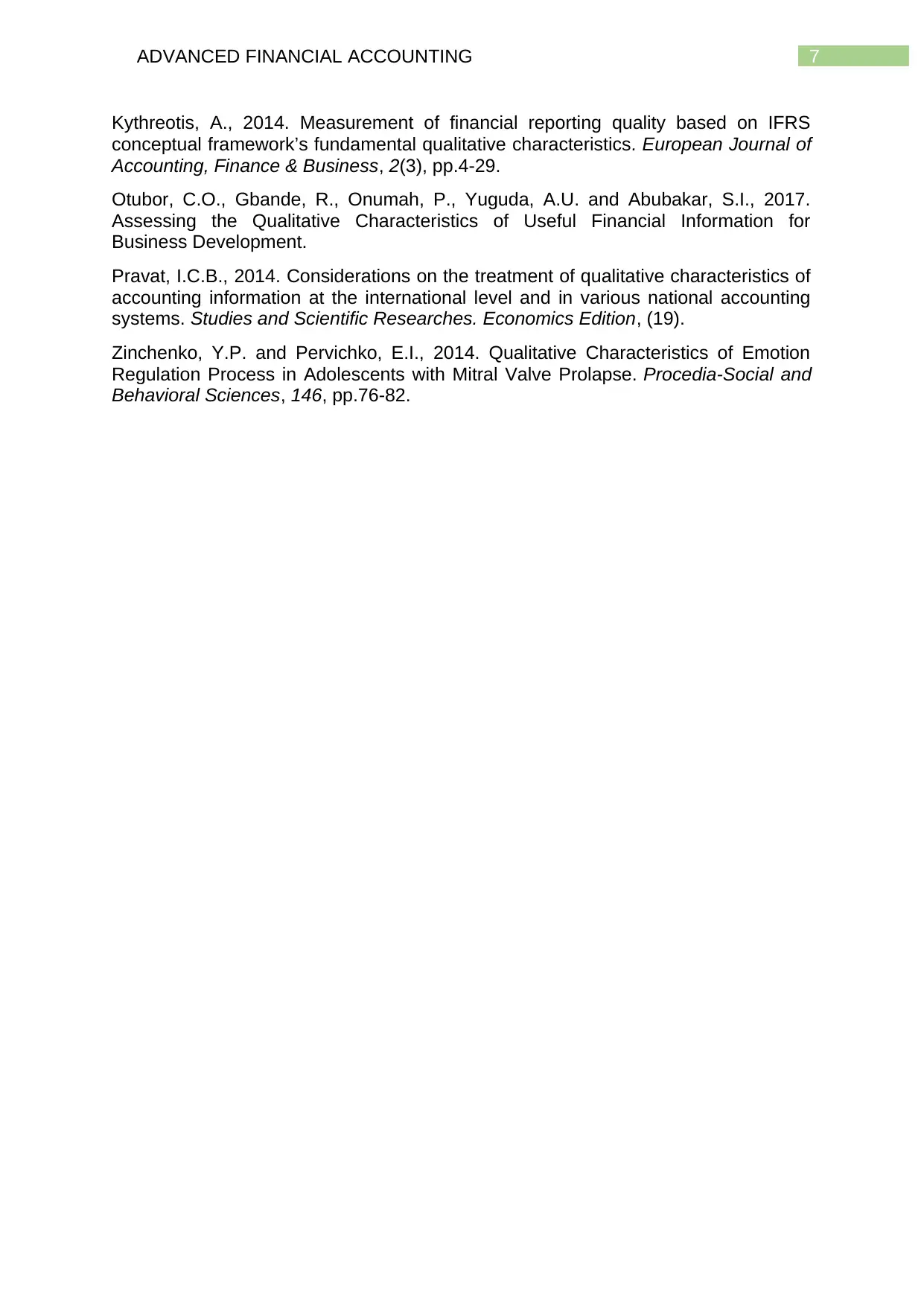
7ADVANCED FINANCIAL ACCOUNTING
Kythreotis, A., 2014. Measurement of financial reporting quality based on IFRS
conceptual framework’s fundamental qualitative characteristics. European Journal of
Accounting, Finance & Business, 2(3), pp.4-29.
Otubor, C.O., Gbande, R., Onumah, P., Yuguda, A.U. and Abubakar, S.I., 2017.
Assessing the Qualitative Characteristics of Useful Financial Information for
Business Development.
Pravat, I.C.B., 2014. Considerations on the treatment of qualitative characteristics of
accounting information at the international level and in various national accounting
systems. Studies and Scientific Researches. Economics Edition, (19).
Zinchenko, Y.P. and Pervichko, E.I., 2014. Qualitative Characteristics of Emotion
Regulation Process in Adolescents with Mitral Valve Prolapse. Procedia-Social and
Behavioral Sciences, 146, pp.76-82.
Kythreotis, A., 2014. Measurement of financial reporting quality based on IFRS
conceptual framework’s fundamental qualitative characteristics. European Journal of
Accounting, Finance & Business, 2(3), pp.4-29.
Otubor, C.O., Gbande, R., Onumah, P., Yuguda, A.U. and Abubakar, S.I., 2017.
Assessing the Qualitative Characteristics of Useful Financial Information for
Business Development.
Pravat, I.C.B., 2014. Considerations on the treatment of qualitative characteristics of
accounting information at the international level and in various national accounting
systems. Studies and Scientific Researches. Economics Edition, (19).
Zinchenko, Y.P. and Pervichko, E.I., 2014. Qualitative Characteristics of Emotion
Regulation Process in Adolescents with Mitral Valve Prolapse. Procedia-Social and
Behavioral Sciences, 146, pp.76-82.
1 out of 8
Related Documents
Your All-in-One AI-Powered Toolkit for Academic Success.
+13062052269
info@desklib.com
Available 24*7 on WhatsApp / Email
![[object Object]](/_next/static/media/star-bottom.7253800d.svg)
Unlock your academic potential
Copyright © 2020–2025 A2Z Services. All Rights Reserved. Developed and managed by ZUCOL.





